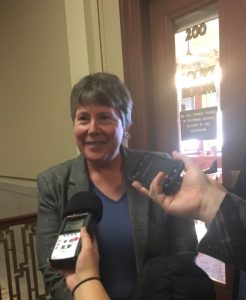Judge voids NIU president’s termination agreement
By Bill Dwyer For Chronicle Media — November 22, 2017
DeKalb County resident and county board member Misty Haji-Sheikh speaks with the media Nov. 22 after a judge granted her motion for summary judgment in her Open Meetings Act lawsuit against the Northern Illinois University Board. (Photo by Bill Dwyer/for Chronicle Media)
A DeKalb County judge on Wednesday declared the termination agreement between former Northern Illinois University President Douglas D. Baker and the university “null and void.”
Judge Bradley J. Waller voided the agreement, which paid Baker nearly $600,000, after ruling that the university had violated the state’s Open Meetings Act when it publicly noticed the board meeting at which Baker’s settlement was approved.
That suit had been brought against the university by Misty Haji-Sheikh, a DeKalb County board member and graduate student at NIU. She accused the university board of intentionally violating the state’s Open Meetings Act by posting a vague and misleading agenda item related to the board’s discussion of Baker’s case.
NIU attorneys had argued that the NIU board’s June 15 meeting was properly noticed and the agenda attached to that notice was adequately descriptive of what they intended to discuss. In any event, they asked that the board’s approval of Baker’s separation agreement remain in force.
“Even if the court finds some kind of technical violation of (the Open Meetings Act),” NIU’s attorney told the judge, “invalidating the (termination) agreement would serve no good public purpose.”
But Waller found that, while NIU had properly noticed the board meeting at which Baker’s separation agreement was approved, the agenda item related to Baker’s termination was “vague” and “ambiguous.”
The judge noted that Illinois law requires that any agenda contain a description of the “general subject matter” to be discussed by a board. He also noted that the agenda item for the NIU board’s discussion read “Presidential employment: Review and approval.”
Waller said he hadn’t found any rulings regarding what is a sufficient description of the term “general subject matter,” but said he was “acutely familiar” with the legislative intent of the law.
“It is the intent of the act itself to protect the citizen’s right to know,” Waller said. “This begs the question, what did the people know in advance of this meeting.” Not enough, he concluded.
“No ordinary citizen could possibly have had any reasonable expectation that he or she knew that the agenda item discussion was focused on anything more than review and approval of the president’s employment.”
“No mention was made of termination, separation or transition agreement. No further specificity was given. I don’t opine on what that specificity would be, but it definitely was not present in this case.”
Haji-Sheikh was understandably pleased, but said she was also a bit disappointed outside the courtroom.
“I’m a little sad we had to go this far,” she said, noting that she had told the NIU board that all they had to do was take a second vote on the termination at a second meeting to satisfy her concerns.
“My whole goal was to get the NIU board to comply with the law.”
Taking up Judge Waller’s point made in his ruling, Haji-Sheikh said, “It is the right of the people to know what their governing bodies do. That is the intent of the Open Meetings Act.”
“I’m a lawmaker,” she said. “And I expect the public that comes to my governing body, the county board, to be able to get the information that they need.” She said she expects the same openness and transparency from other governing bodies.
“By the way, I love NIU,” she added. “I’m trying to make it the best it can be.”
Judge Waller said Haji-Sheikh’s motion for the payment of attorney’s fees by the university would be discussed and likely ruled on at a status hearing Dec. 8 at 9 a.m.






